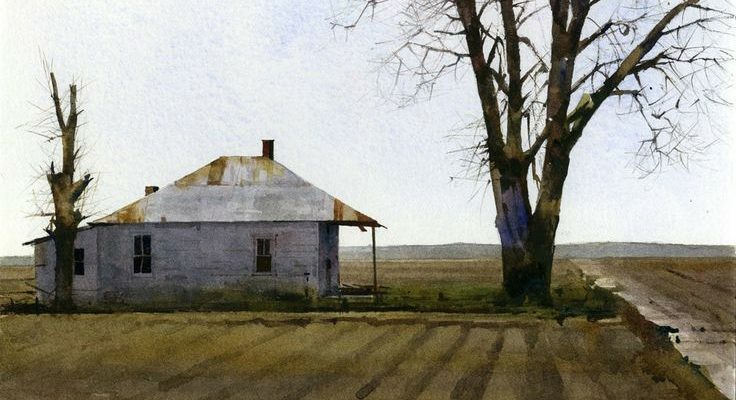My great-grandmother was really the last of the West Tennessee sharecroppers. She never owned a house until my father built her a small place in the 90s. When I was a small child, she lived in a tiny sharecropper cabin in a hollow (“holler”) next to a creek (“crick”). The cabin had no running water and a wood stove. Every morning that little 80-something-year-old woman would cross the street to get two 5-gallon buckets from a hillside spring; one for washing and one for cooking. Her bathroom was a chamber pot in the back. She had a small black and white television with two channels (sometimes). I remember the sound of the rain on her tin roof and sitting on her front porch watching the fireflies in the summer night.
She came from a family of eight children and when she was 16 she married the son of another sharecropper. He was an alcoholic and died in a car accident when my grandfather and his sister were still children. She never remarried. She raised her kids to be tough, because they had to be.
I remember her hands. They were the hardest, toughest hands I have ever felt on a woman, but they were also unspeakably tender and soft. Those hands had wrung the neck of many a chicken for frying. Those hands had swatted our butts and kneaded the dough for our biscuits. She would cook apple pies and fried chicken (wishbones) for me and my cousins, while we played with blocks on the faded linoleum. She loved crochet and coloring books.
As she got older her memory faded. By the time she passed at 101-years-old, her mind was long gone, but her love was with us still, and oh how we loved her. Her funeral was attended by her two children, six surviving grandchildren, sixteen great-grandchildren and two great-great-grandchildren.
She was poor every day of her living life. She owned almost nothing. Yet, how rich a legacy she left behind. When Yankee academics speak of white privilege, I think of her. And, I think of my cousin when his mother died of throat cancer in their trailer north of Memphis, his truck-driver father nodding out on pain pills on the couch. I think of my friend up in Grassy, Kentucky who supported her whole family off her job at the Walmart an hour down the winding roads to Harlan. I think of the stories my father tells of how his family would trap and fatten a possum with corn when meat was scarce.
The story of Southerners is not all about cavaliers and plantation homes. So much of the South’s story is little one-room cabins and sharecroppers. My family is not poor anymore and certainly many of my ancestors were not broke dirt farmers, but on the whole, we, like so many families in the South, clawed our way out of poverty with little more than a hoe, a hammer, and a shotgun. No matter how often the Yankee academics spread their lies, you will never take that from me.
-By Will Hurst

O I’m a good old rebel, now that’s just what I am. For this “fair land of freedom” I do not care at all. I’m glad I fit against it, I only wish we’d won, And I don’t want no pardon for anything I done.






My great grandmother was born into the little house on the prairie world in the 1880’s early 1890. Telegraph, steam engines, and stagecoaches, literally. She died on her 105th birthday with her family around. From stagecoaches to desktop computers in one lifetime. Nobody will ever see that much change again in a lifetime I imagine. She was lived in Oklahoma, and was widowed early, and stayed that way the rest of her life. I was in awe of her story as kid.
Sounds like my great Grandmother. She has running water and indoor plumbing in her house now but still collects rain water and spring water. she plants by the signs and keeps fried chicken made at all hours. Saves money like she is in the depths of the depression too. she probably has 50k under the floor. not the monetary planning you find much these days.
Compelling stuff, thanks for sharing
Thank you for this. These are the stories, and the people who remind us who we are. I’ve got some of my own. And I’m damned proud of them.